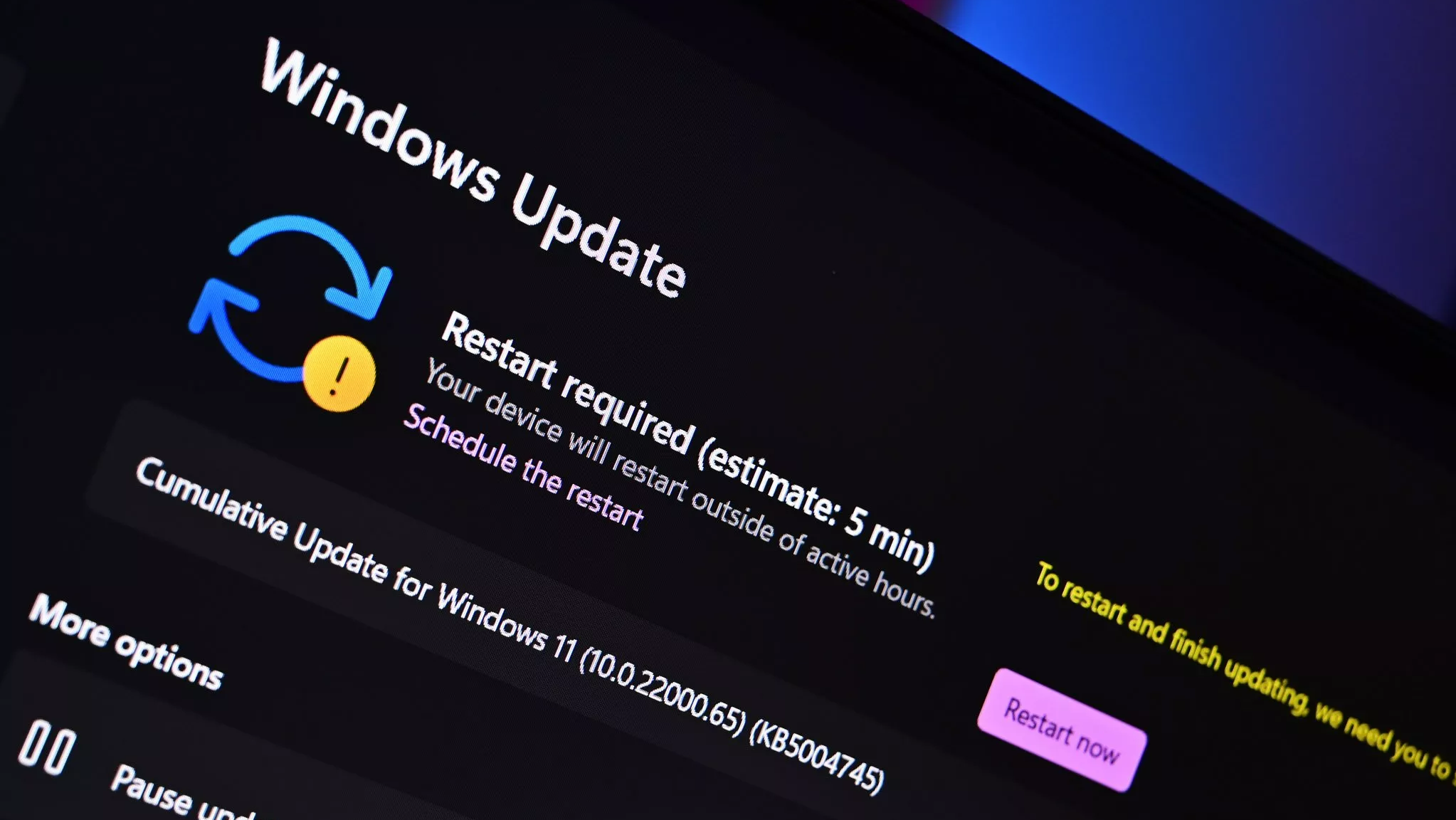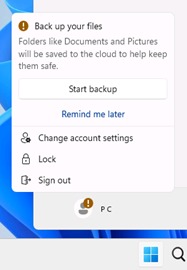
What you need to know
- Microsoft just rolled out its Patch Tuesday update for Windows 11.
- The update brings systems to build 22621.1555 and will ship to systems automatically.
- Several security improvements are part of the update, as well as a short list of changes.
- The latest version of Windows 11 will show a notification within the Start menu to back up files through OneDrive for some users.
With the second Tuesday of the month in the rearview mirror, Microsoft has shipped its April Patch Tuesday update for Windows 11. The update includes several security improvements. It also has some minor changes, such as the search box in the Taskbar being light when Windows is set to a custom color mode.
The update is available through Windows Update, Microsoft Update, and Windows Update for Business. Users can also get it through the Microsoft Update Catalog. Windows Server Update Services will automatically sync with the update depending on your configuration.
Microsoft highlighted the following improvements in a support document:
- New! This update implements the new Windows Local Administrator Password Solution (LAPS) as a Windows inbox feature. For more information, see By popular demand: Windows LAPS available now!
- This update addresses a compatibility issue. The issue occurs because of unsupported use of the registry.
The update also includes all of the improvements that shipped with the Windows 11 optional update that shipped at the end of March (KB5023778). Among those changes is the addition of a prompt that suggests people back up their files through OneDrive.

That notification caused debate when it was first announced as an addition to Windows. People disagree on the nature of those types of prompts, with some calling them ads and others viewing them more favorably. In our poll about the topic, over 52% of participants said that they view the notification to back up files to OneDrive as an ad, but over 47% said they did not view it as an ad.
Here is what shipped with the optional update in March that's rolling out to PCs now in the latest Patch Tuesday update:
Build 22621.1555: Highlights
- New! This update introduces notifications for Microsoft accounts in the Start menu. This is only available to a small audience right now. It will deploy more broadly in the coming months. Some devices might notice different visual treatments as we gather feedback. See the example below.
- New! The search box on the taskbar will be lighter when you set Windows to a custom color mode. This will occur when you set the Windows mode to dark and the app mode to light in Settings > Personalization > Colors.
- This update addresses an issue that affects the Notepad combo box in Settings. It fails to show all the available options.
- This update addresses an issue that affects Microsoft PowerPoint. It stops responding. This occurs when you use accessibility tools.
- This update addresses an issue that affects Microsoft Narrator. It fails to read items in dropdown lists in Microsoft Excel.
- This update addresses an issue that affects USB printers. The system classifies them as multimedia devices even though they are not.
Build 22621.1555: Improvements
- New! This update adds many new features and improvements to Microsoft Defender for Endpoint. For more information, see Microsoft Defender for Endpoint.
- New! Once you have access to the new Bing, the search box on the taskbar might include a button that opens the Bing chat experience in Microsoft Edge. If you don’t have access, the search box on the taskbar will feature a dynamic search highlight button.
- This update addresses an issue that affects complexity policy settings for PINs. They are ignored.
- This update addresses an issue that affects the Fast Identity Online 2.0 (FIDO2) PIN credential icon. It does not appear on the credentials screen of an external monitor. This occurs when that monitor is attached to a closed laptop.
- This update addresses an issue that affects a Clustered Shared Volume (CSV). The CSV fails to come online. This occurs if you enable BitLocker and local CSV managed protectors, and the system recently rotated the BitLocker keys.
- This update addresses an issue that affects Active Directory Users & Computers. It stops responding. This occurs when you use TaskPad view to enable or disable many objects at the same time.
- The update addresses an issue that affects the Remote Procedure Call Service (rpcss.exe). The issue might cause a race condition between the Distributed Component Object Model (DCOM) and the Microsoft Remote Procedure Call (RPC) endpoint mapper.
- This update addresses an issue that affects Microsoft PowerPoint. It stops responding on the Azure Virtual Desktop (AVD). This occurs when you use Visual Basic for Applications (VBA).
- This update addresses an issue that affects Windows Search. Windows Search fails inside of Windows container images.
- This update affects the Group Policy Editor. It adds Transport Layer Security (TLS) 1.3 to the list of protocols that you can set.
- This update affects the Arab Republic of Egypt. The update supports the government’s daylight saving time change order for 2023.
- This update affects jscript9Legacy.dll. It adds ITracker and ITrackingService to stop MHTML from not responding.
- This update addresses an issue that affects the Microsoft HTML Application Host (HTA). This issue blocks code execution that uses Microsoft HTA. This occurs when you turn on Windows Defender Application Control (WDAC) User Mode Code Integrity (UMCI) enforced mode.
- This update affects the Group Policy Management Console. It addresses a scripting error in the Group Policy Preferences window.
- This update addresses an issue that affects the Windows Remote Management (WinRM) client. The client returns an HTTP server error status (500). This error occurs when it runs a transfer job in the Storage Migration Service.
- This update addresses an issue that affects Desired State Configuration. It loses its previously configured options. This occurs if metaconfig.mof is missing.
- This update addresses an issue that affects the Dynamic Host Configuration Protocol (DHCP) option 119 - Domain Search Option. The issue stops you from using a connection-specific DNS Suffix Search List.
- This update addresses a rare issue that might cause an input destination to be null. This issue might occur when you attempt to convert a physical point to a logical point during hit testing. Because of this, the computer raises a stop error.
- This update addresses an issue that affects the Simple Certificate Enrollment Protocol (SCEP) certificate. The system reports some SCEP certificate installations as failed. Instead, the system should report them as pending.
- This update addresses an issue that affects the new Windows Runtime (WinRT) API. This issue stops an application from querying for location information using MBIM2.0+.
- This update addresses a known issue that affects kiosk device profiles. If you have enabled automatic logon, it might not work. After Autopilot completes provisioning, these devices stay on the credential screen. This issue occurs after you install updates dated January 10, 2023, and later.
- This update affects Xbox Elite users who have the Xbox Adaptive Controller. This update applies your controller remapping preferences on the desktop.
- This update addresses an issue that might affect your audio. It might cause glitching or screeching. This occurs when the system is under a heavy load or wakes from sleep.
- This update addresses an issue that stops WDAC from parsing fields from binaries.
- This update addresses an issue that might affect Win32 and Universal Windows Platform (UWP) apps. They might close when devices enter Modern Standby. Modern Standby is an expansion of the Connected Standby power model. This issue occurs if certain Bluetooth PhoneLink features are turned on.







